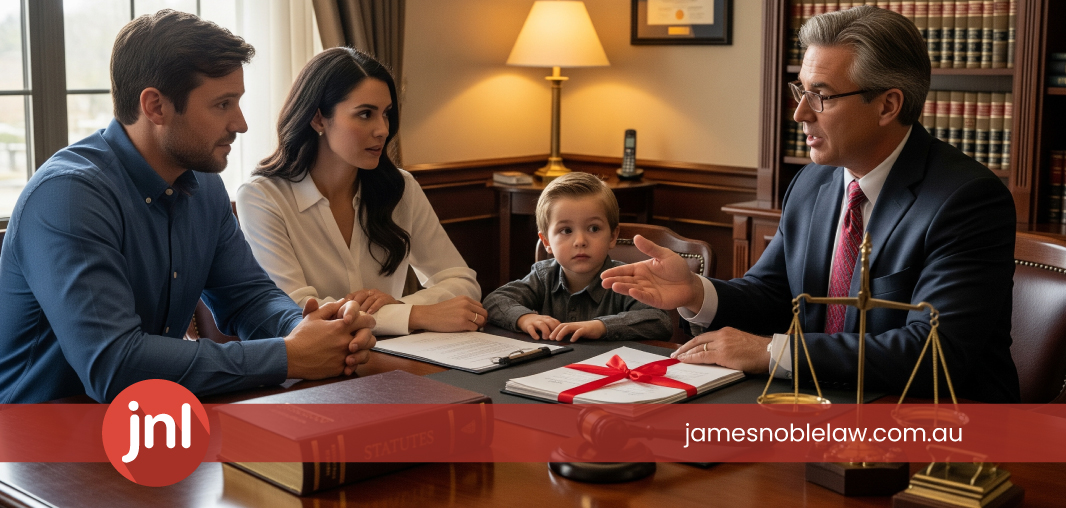Why Expert Representation at Mediation is Crucial for Your Family Law Matters
Mediation is often seen as a more amicable way to resolve family disputes without the need for lengthy and expensive court battles. It offers parties the opportunity to negotiate directly with each other in a controlled, respectful environment with the assistance of a neutral mediator. However, while mediation can be less stressful and more cost-effective than going to court, it can also be complex and emotionally charged. This is where expert representation can make all the difference in ensuring that...
Read More
Can a Binding Financial Agreement Be Overturned? Here’s What You Need to Know
Binding Financial Agreements (BFAs), commonly known as prenups or financial separation agreements, are legal documents designed to give couples clarity and certainty when it comes to managing their assets and finances in the event of separation or divorce. But what happens if one party feels the agreement was unfairly made? Can a BFA be challenged or set aside by the Court? The answer is yes, but under extremely specific circumstances. In this article, we’ll break down when and how a...
Read More
Are Binding Financial Agreements in De Facto Relationships Truly Watertight? Here’s What You Need to Know
Why Legal Protection Matters in De Facto Relationships As de facto relationships become increasingly common across Australia, many couples are choosing to live together and share their lives without formal marriage. But with shared lives come shared assets, and when relationships break down, dividing property can quickly become a complicated and emotionally fraught process. Enter the Binding Financial Agreement (BFA). This legal document aims to protect the assets you brought into the relationship and clarify how property should be divided...
Read More
Break Up Without the Breakdown: Your Ultimate Guide to Consent Orders in QLD
Going through a separation is never easy - but navigating it doesn’t have to be confusing. If you and your former partner have reached an agreement on parenting or financial matters, there’s a stress-free, cost-effective way to make that agreement legally binding. Enter: Consent Orders in QLD. At James Noble Law, we specialise in helping Queensland families move forward with confidence and clarity. With over 50 years of experience in Family Law, our team is here to simplify the process,...
Read More
Domestic Violence Legal Support FAQ – James Noble Law Brisbane and Gold Coast
Domestic violence is a serious and sensitive issue that affects many people in the community. Understanding your rights and the legal protections available is an important step toward safety and healing. At James Noble Law, we are committed to providing compassionate and expert legal assistance to those affected by domestic and family violence. Below are some frequently asked questions to help you better understand domestic violence laws and how we can support you through this difficult time. Domestic Violence Legal...
Read More
Breaking the Silence: How James Noble Law Supports Domestic Violence Survivors on the Gold Coast
The Gold Coast, with its sun-drenched beaches, vibrant lifestyle, and thriving communities, is often seen as a place of opportunity and relaxation. But beneath this idyllic surface lies a harsh reality: domestic violence. It’s an issue that cuts across all ages, genders, and backgrounds, leaving deep emotional and physical scars. If you or someone you know is experiencing domestic violence, the path to safety can seem overwhelming and frightening. But it’s important to remember-help is available, and you don’t have to...
Read More
Answers to common questions about family law in Queensland
Top 10 Family Law Questions Answered by Experts at James Noble Law 1. What is family law and what does it cover? Family law in Australia deals with legal issues involving relationships, children, and property after separation. At James Noble Law, we provide advice and representation in matters such as divorce, de facto relationships, child custody, parenting arrangements, property settlements, and spousal maintenance. 2. How do I start divorce proceedings in Queensland? To apply for a divorce in Queensland, you...
Read More
Is Your Binding Financial Agreement Bulletproof? Here’s What You Need to Know
You’ve gone through the time, effort, and cost of preparing a Binding Financial Agreement (BFA) - but is it actually binding? Many people believe that once they sign a BFA, they’re protected from future disputes over property, finances, or spousal maintenance. But as numerous court cases have shown, that’s not always the case. At James Noble Law in Toowong, we’ve seen how improperly executed BFAs can be overturned-sometimes years after they’re made. In this article, we’ll explore the most common...
Read More
Why You Need a Binding Financial Agreement Before You Marry in Australia
Marriage is often seen as the ultimate romantic commitment, a beautiful union of two people who share not only love but also hopes, dreams, and a future. However, alongside the excitement of wedding planning and a new life together, it's important to consider the financial realities that come with marriage. This is where a Binding Financial Agreement (BFA) comes into play—an essential legal document that every couple should consider before walking down the aisle in Australia. What is a Binding...
Read More
What Age Does My Child Get a Say in Whether They See the Other Parent?
By James Noble Law, Queensland Family Law Experts When it comes to parenting arrangements after separation or divorce, one of the most common questions we receive at James Noble Law is: “At what age does my child get to decide whether they want to see the other parent?” This is a complex and sensitive issue that touches on the emotional wellbeing of the child, parental rights, and the legal principles guiding family law in Australia. In Queensland, as across Australia,...
Read More
Binding Financial Agreements: The Right Questions to Ask Your Lawyer First
When entering a relationship or going through a separation, financial security and clarity are paramount. That’s where a Binding Financial Agreement (BFA) may be advisable. At James Noble Law, we believe in proactive planning to protect your assets and ensure peace of mind. But the success of a BFA hinges not just on having one—but on asking the right questions before it's drafted. Knowing what to ask your lawyer can make the difference between an enforceable, effective agreement and one...
Read More
Breaking Free: How to Safely Leave a Domestic Violence Relationship in Queensland
Leaving a domestic violence (DV) relationship is one of the bravest and most life-changing decisions a person can make. At James Noble Law, we understand the fear, uncertainty, and overwhelming logistics that come with this step—especially when children and property are involved. Based in Queensland, we’re here to help guide you through this complex process with compassion, clarity, and legal expertise. Whether you’re in Brisbane, the Gold Coast, or regional Queensland, you have rights—and you are not alone. Understanding Domestic...
Read More
Facing Separation: Navigating the Complexities of Children, Property, and Wills with James Noble Law
Separation is never easy, and when your partner seeks a separation, it can feel like the ground has been pulled out from under you. Whether it’s how to tell your children, divide property, or update your Will, the emotional and legal aspects of a separation can be overwhelming. Thankfully, there are steps you can take to ensure that you handle the situation with clarity, confidence, and with the support you need. James Noble Law is here to guide you through...
Read More
Finalising Your Property Settlement: Financial Agreement vs Consent Orders – Which Path is Right for You?
Considering separating from a partner is never easy—and dividing assets and property can be one of the most complex and emotionally charged parts of the process. Whether you’ve already agreed on how to divide your finances or you’re still working through the details, it’s crucial to legally finalise your property arrangements or settlement to avoid future disputes. Understanding the differences between Financial Agreement vs Consent Orders is essential to making informed decisions and ensuring long-term peace of mind. At James...
Read More
Court Forms Without the Chaos: James Noble Law Takes the Complexity Out of Family Law
When Paperwork Feels Like a Legal Minefield If you're in the middle of a family dispute, separation, or child custody matter, chances are you're already feeling emotionally drained. Then come the court forms— filled with unfamiliar language, legal traps, and intimidating deadlines to overwhelm even the most organised person. But you don’t have to face it alone. Having a trusted family lawyer by your side isn’t just about legal advice—it’s about peace of mind. At James Noble Law, we help...
Read More
Why Financial Agreements in Australian Family Law Seem Expensive — And Why They’re Worth It
"Peace of Mind Over Price: Why Financial Agreements Are Worth the Cost with James Noble Law" Financial agreements in Australian family law—such as Binding Financial Agreements (BFAs) made before, during, or after a relationship—often appear costly. However, these expenses reflect the level of legal precision and protection involved. When compared to cheaper alternatives that can be easily overturned, a properly prepared agreement is a smart and lasting investment. There are several reasons why these agreements cost more than many expect:...
Read More
Planning Love and Life: When a Binding Financial Agreement is the Right Choice
When you’re in love or building a life with someone, the last thing you want to think about is a breakup. But just like insurance, estate planning, or a will, a Binding Financial Agreement (BFA) is about preparing for the unexpected. In Australia, BFAs are a legally binding way to define how your property, finances, and debts will be divided if your relationship ends. And while they’re often associated with wealth or celebrity divorces, they’re becoming increasingly common—and useful—for everyday...
Read More
Love, Money, and Legal Lines: What Aussies Are Asking Now About Financial Agreements
In today’s world of complex relationships, blended families, and evolving financial landscapes, more Australians are turning to financial agreements to protect their interests and avoid lengthy court disputes. Commonly known as Binding Financial Agreements (BFAs), these legal tools allow couples to decide how assets and finances will be managed during and after a relationship. But as society changes, so do the legal questions people are asking. From cryptocurrencies to inheritances, and de facto rights to enforceability—there’s growing curiosity (and confusion)...
Read More
Untying the Knot: Top Divorce Questions in Queensland — Answered by James Noble Law
When facing a divorce, it's completely normal to feel overwhelmed, confused, and even a little lost. In Queensland, the legal process can seem complicated without the right guidance. Thankfully, James Noble Law, one of Brisbane's most respected family law firms, is here to simplify things. Here are some of the most commonly asked questions about divorce in Queensland, along with how the team at James Noble Law expertly addresses each concern. 1. How long do I have to be separated...
Read More
Top 10 Questions to Ask Before Hiring a Family Lawyer — And How James Noble Law Answers Them
When navigating the complexities of family law, selecting the right legal representation is paramount. James Noble Law, based in Queensland, stands out as a trusted firm with over 50 years of experience in family law. Led by Charles Noble and Accredited Specialist James Noble, the firm is renowned for its client-focused and results-driven approach. Here are the top 10 questions prospective clients often ask when considering engagement with a family law firm, along with insights into how James Noble Law...
Read More






















